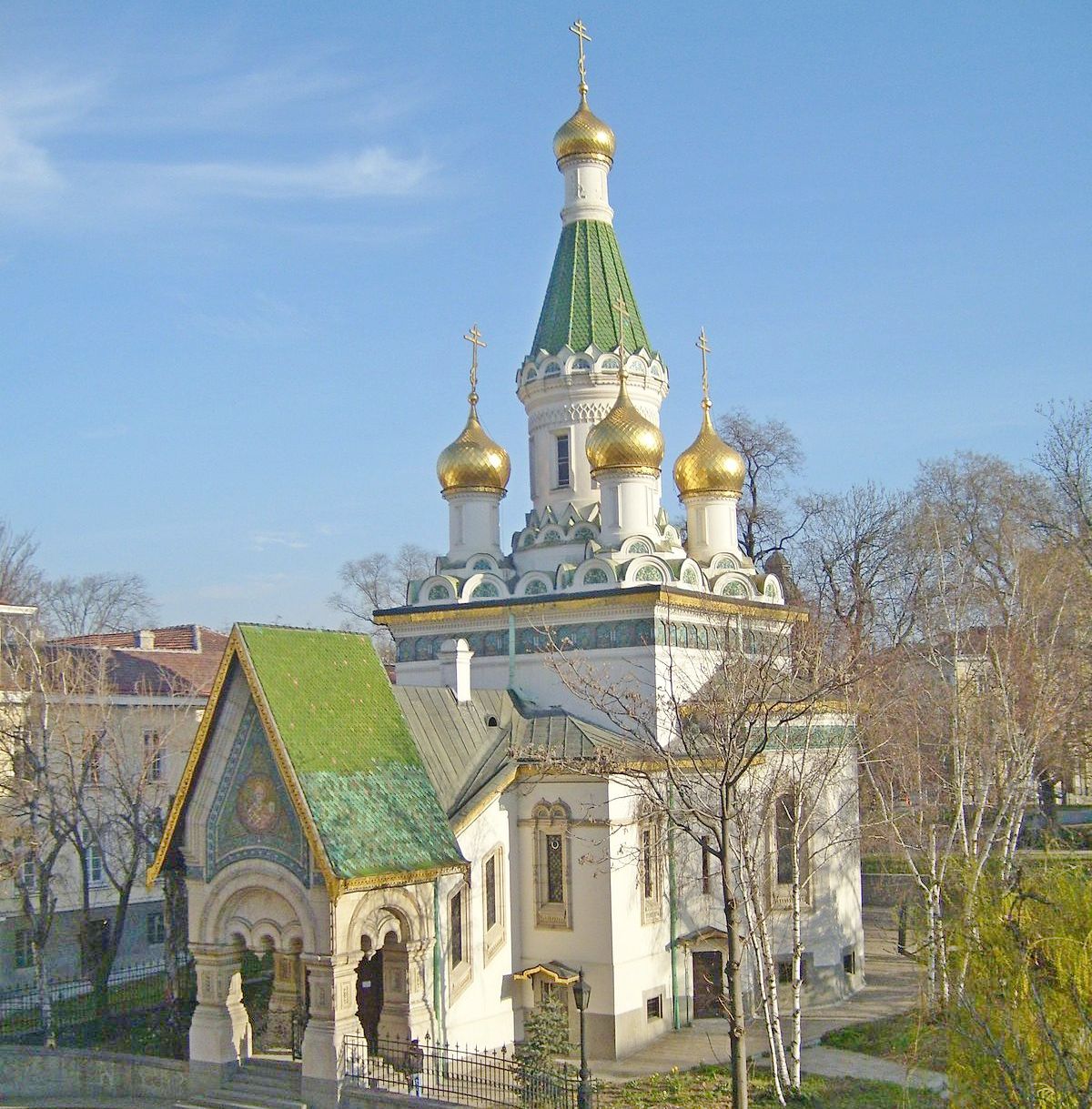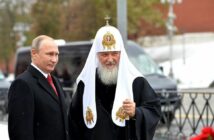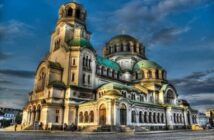Source: Peter Anderson, Seattle USA
Among the Local Orthodox Churches, it is common for one Local Orthodox Church to have a representation church (more properly called a podvorie or metochion) at the seat of another Local Orthodox Church. This is true of the Moscow Patriarchate and the Bulgarian Patriarchate. The Bulgarian Patriarchate has a representation church in Moscow. Conversely, the Moscow Patriarchate has a representation church in Sofia. The church in Sofia is the Church of St. Nicholas the Miracle-Worker, located in central Sofia. It is also known as the “Russian Church.” (link) Many come to pray here because the church is the location of the grave of Archbishop Seraphim (Sobolev) of Bochugarsk (1881-1950). Archbishop Seraphim is a Russian hierarch who cared for the Russian parishes in Bulgaria from 1921 to 1950. He was canonized by the Moscow Patriarchate in 2016. Since 2018, the dean of the Russian Church in Sofia has been Archimandrite Vassian (Zmeyev), a priest of the Moscow Patriarchate and a Russian citizen. (link – brief biography)
On September 21, 2023, Bulgarian governmental authorities expelled from the country three persons connected with the Russian Church — Archimandrite Vassian (dean), Archpriest Yevgeny Pavelchuk (parish secretary), and a staff member of the church. The latter two are citizens of Belarus. Shortly after the expulsions, a press release was posted by the Bulgarian State Agency for National Security (“DANS”). (link) The press release stated that by order of the chairman of DANS, the three individuals were subject to expulsion, deprivation of the right of residency, and a ban on entering Bulgaria for a period of five years. The reason for this order was described as follows:
The measures were imposed in connection with their activities directed against the national security and interests of the Republic of Bulgaria. Data were obtained on the actions of the mentioned persons related to the implementation of various elements of the Russian Federation’s hybrid strategy for purposefully influencing the socio-political processes in the Republic of Bulgaria in favor of Russian geopolitical interests.
Many news sites in North Macedonia have reported that shortly before September 21, Archimandrite Vassian had also been banned from North Macedonia by the governmental authorities there. (link); However, to date, there has been no official confirmation of this by the governmental authorities of North Macedonia.
On the same day that Archimandrite Vassian was expelled from Bulgaria, the Moscow Patriarchate issued a strong protest, and a separate protest was issued by the Russian Foreign Ministry Spokeswoman Maria Zakharova. The Patriarchate’s statement can be read in full in English at (link). It includes the following:
The Russian Orthodox Church has protested in the strongest terms against the unjust expulsion of its representatives from Bulgaria. The expulsion of priests, whose calling is service to God and people and the preaching of peace and brotherhood among nations, is an outrageous act dictated by Russophobic motives and the desire to erase the glorious pages of the common history of Bulgaria and Russia….Today’s decision by the Bulgarian authorities demonstrates their disrespect for the feelings of believers who have now been denied the opportunity of visiting his [St. Seraphim’s] tomb as a result of the cessation of the activities of the Russian metochion.
The protest by Maria Zakharova can be read in full in English at (link).
People who have dedicated their lives to serving God in the name of unity between the Russian and Bulgarian peoples based on a shared religion and Christian values were transported like criminals in a vehicle with barred windows back to the church by Bulgaria’s immigration service for them to pack their belongings. Today, they will be deported as lawbreakers. They will simply be left at the Serbian border to fend for themselves. Adding a particularly blasphemous dimension to this situation is the fact that this action was taken on a festive day that marks the Nativity of the Most Holy Mother of God which is a sacred and pure day for the Russian Orthodox Church parishioners. We are outraged and shocked by what happened….This old Russian church, which has served as a place of shared worship for Russians and Bulgarians for many years, will now be closed.
The Russian Church was in fact closed. Immediately after the expulsion, the Russian Church was locked and sealed by personnel from the Russian Embassy in Sofia. The Russian ambassador contends that the closure was not a form of retaliation for the expulsions but simply because there was insufficient staff to operate the church. However, it quickly appeared that this problem would be solved because Patriarch Neofit, primate of the Bulgarian Patriarchate, made the decision on September 25 to appoint five of his priests to serve at the Russian Church. This action was reported in a press release issued by the Sofia Metropolia. (link) The press release is as follows:
With his order dated today, 25/09/2023, His Holiness Bulgarian Patriarch Neofit, in the exercise of his powers as Metropolitan of Sofia, in whose diocese is located the “St. Nicholas Mirlikiyski” temple, personally appointed priests from Sofia who will take care of the temple, performing the usual services. The Holy Metropolis of Sofia guarantees that no part of the property of the church will be lost or damaged. As before, believers will be able to venerate the relics of Saint Seraphim of Sofia and beg for his gracious help and support. The action of His Holiness is dictated by care for the faithful, preservation of good order in the church and should be understood only in its spiritual aspect. It does not affect the property or other rights of anyone as guaranteed to them by secular laws. Any other questions of a secular legal and administrative nature related to the case will be discussed at the regular meeting of the Holy Synod of the Bulgarian Orthodox Church – Bulgarian Patriarchate. His Holiness Bulgarian Patriarch Neofit has informed the Patriarch of Moscow and All Rus’ Kirill about the actions taken in a special letter. His Holiness expects assistance from the Embassy of the Russian Federation in Sofia for the opening of the temple and the continuation of its blessed life, which plays an important role in the spiritual upliftment of Orthodox Christians. Before assuming their duties, the clerics were received by His Holiness in the building of the Sofia Holy Metropolis, who blessed them and gave them his primate ministerial instruction in carrying out the upcoming responsibilities.
Bulgarian Justice Minister Atanas Slavov has subsequently called the closure of the Russian Church “unacceptable” and has blamed the “Russian state in the person of the ambassador.” (link) The Minister stated: “ This is arbitrariness in the field of canon law. Perhaps government measures should be taken.”
On October 3, the Holy Synod of the Bulgarian Patriarchate met to discuss the Russian Church matter. The resulting decision of the Synod is divided into three paragraphs. (link) The first paragraph provides: Fully supports the letter and actions of the Bulgarian Patriarch in his capacity as Metropolitan of Sofia regarding the temple-courtyard “St. Nikolay Mirlikiski Miracle Worker” in Sofia, and sending the letter to Patriarch Kirill of Moscow and All Rus’. The reference to “actions” appears to be the appointment of priests of the Bulgarian Patriarchate to serve in the Russian Church. The “letter” refers to the letter informing Patriarch Kirill of these actions. A copy of this letter has never been made public. Metropolitan Daniil of Vidin dissented with respect to this paragraph. (link) (dissenting opinion). Metropolitan Daniil, who frequently supports the Moscow Patriarchate, contends that the Bulgarian Patriarchate has no jurisdiction over the Russian Church or to appoint priests for it. Presumably, all of the other members of the Holy Synod believe that the Bulgarian Patriarchate does have jurisdiction. Interestingly, with respect to the representation church of the Bulgarian Patriarchate in Moscow, the church is run by priests of the Moscow Patriarchate, and the actual representative of the Bulgarian Patriarchate has only honorary functions in the representation church. (link)
The second paragraph of the decision provides: The Holy Synod expresses hope that the temple will be opened as soon as possible, but this is not within the competences and powers of the BOC-BP. This sentence is somewhat ambiguous. It could simply mean that the Bulgarian Patriarchate does not have the power to open the representation church because the Russian ambassador has the key to the church. A less plausible interpretation is that the Bulgarian Patriarchate cannot open the church because it has no jurisdiction over the church. However, this interpretation is inconsistent with the first paragraph which upholds the actions of the Bulgarian Patriarch in appointing priests for the representation church – an action requiring jurisdiction. The third paragraph of the decision provides: Assigns to the canonical-legal commission of the Holy Synod to study and analyze the statutes for the functioning of the Podvorie in Sofia and Moscow, after which a decision will be made.
On October 4, the communications service of the Moscow Patriarchate’s DECR posted a report that Patriarch Kirill had sent a reply to the letter received from Patriarch Neofit. (link) (English) The DECR report does not provide a copy of Patriarch Kirill’s letter. With respect to Patriarch Neofit’s letter, the DECR report only states: “In his appeal to His Holiness the Patriarch of Moscow and All Rus’ Kirill, His Holiness Patriarch of Bulgaria Neophyte expressed his concern at the suspension of the liturgical life in the Church of Saint Nicholas in Sofia.” The DECR report makes mention of the appointment of priests by Patriarch Neofit for the Russian Church in Sofia or that aspect of Patriarch Neofit’s letter to Patriarch Kirill. The DECR report also does not mention that it was the Russian Embassy that locked the Russian Church. The DECR report does state:
In his letter of reply the Primate of the Russian Orthodox Church noted the unprecedented nature in recent history of the decision by the Bulgarian authorities and expressed his profound regret with regard to the use of humiliating and discriminatory measures towards religious ministers with the clear aim of damaging the friendly relationship between the fraternal nations and sisters Churches. His Holiness the Patriarch labelled the actions of the Bulgaria state authorities an unfriendly and unjust act towards the metochion of the Russian Orthodox Church, emphasizing at the same time that the Moscow Patriarchate was willing to continue its cooperation with the representative of the Patriarch of Bulgaria to the Patriarchal Throne of Moscow in his ministry for the good of the two Churches and assuring the Bulgarian Patriarch of his support for the work of the metochion of the Bulgarian Orthodox Church in Moscow.
Sharing his concern with His Holiness Patriarch Neophyte over the temporary cessation of worship and the closure of the Church of Saint Nicholas, expressing his sympathies for the parishioners and churchgoing people of Sofia and deeply regretting that at present there is no possibility of visiting the church and praying at the tomb of Saint Seraphim of Boguchar, His Holiness Patriarch Kirill made clear that full responsibility for the suspension of the work and activities of the metochion lies with those who took the decision to deport its dean and coworkers.
The Primate of the Russian Orthodox Church notified His Holiness the Patriarch of Bulgaria and Metropolitan of Sofia that the Holy Synod of the Moscow Patriarchate in the near future will appoint a new dean so that the doors of the Russian metochion would be open as soon as possible. The letter also contains a request to help the soon-to-be appointed dean to settle in Sofia.
From all of this, it is apparent that the Moscow Patriarchate will not allow the priests appointed by the Bulgarian Patriarch to open and serve at the Russian Church even though permitting this on a temporary basis would allow the faithful to worship there. The report makes clear that the Church would only open after a new dean for the Russian Church in Sofia is appointed in the near future by the Holy Synod of the Moscow Patriarchate. In the future one can expect a continuing controversy as to whether the Russian Church in Sofia is under the Bulgarian or Russian Orthodox jurisdiction. With respect to the Bulgarian representational church in Moscow, it appears clear that it is presently under the jurisdiction of the Moscow Patriarchate.
Peter Anderson, Seattle USA




